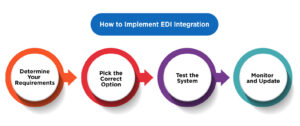The world of business is constantly looking for ways to streamline operations and improve efficiency. One solution that has proven its value across industries is EDI integration. However, what is EDI and why is it so important to the success of your company? Let's dissect it.
What is EDI Integration?
EDI, or Electronic Data Interchange, is a system that allows businesses to exchange documents and data electronically without manual intervention. Instead of sending purchase orders, invoices, or shipping notices on paper or via email, EDI automates these processes by transferring data in a standardized electronic format.
EDI integration refers to the process of incorporating EDI into your existing business systems, such as your ERP, CRM, or supply chain management software. It reduces errors and does away with the need for manual data entry by enabling smooth communication between your system and your partners.
Why Business Success Requires EDI Integration?
- Increased Efficiency and Speed - Manually entering data is time-consuming and error prone. With EDI integration, data flows automatically between systems, drastically reducing the time it takes to process orders, invoices, or shipments. This increased efficiency allows your team to focus on more strategic tasks, rather than getting bogged down by administrative work.
- Cost Savings- By automating document exchange, EDI integration helps businesses save on costs related to paper, printing, postage, and human labor. Moreover, reducing errors in data entry minimizes costly mistakes, such as incorrect shipments or miscommunication with suppliers.
- Enhanced Accuracy and Reliability- Human mistakes are a constant risk in manual procedures. EDI integration ensures that the data exchanged between systems is accurate and consistent, leading to fewer disputes, fewer returns, and better relationships with your business partners. This accuracy also improves forecasting and inventory management, making your operations smoother and more reliable.
- Better Partner Relationships- In today’s interconnected business world, maintaining strong relationships with suppliers, vendors, and customers is key. EDI integration strengthens these relationships by ensuring faster and more accurate communication. Your partners will appreciate the seamless transaction process, which can lead to improved trust and long-term business success.
- Compliance with Industry Standards- Many industries, such as retail, manufacturing, and healthcare, require businesses to adopt EDI integration as part of their operational processes. Failing to implement EDI can lead to non-compliance with industry regulations or losing partnerships with major players who rely on it. Having EDI integrated ensures your business remains compliant and competitive.

How to Implement EDI Integration
Implementing it successfully requires a methodical approach:
- Determine Your Requirements: Identify the business processes that EDI will help. Identify which partners require EDI integration.
- Pick the Correct Option: Pick an EDI supplier that works with your current systems and is within your price range.
- Test the System: Before going live, test the integration to ensure it works seamlessly with your partners’ systems.
- Monitor and Update: After implementation, continuously monitor the performance and ensure updates to keep up with industry changes.
Conclusion
EDI integration is no longer a luxury—it’s a necessity for businesses that want to stay competitive in a fast-paced, digital-first environment. By improving efficiency, reducing costs, enhancing accuracy, and ensuring compliance, it plays a critical role in driving business success. If your business hasn’t embraced EDI, now is the time to consider its potential to transform your operations and position you for long-term growth. :
You May Also Like:
What is Robotic Process Automation (RPA)? Exploring the Top Benefits






